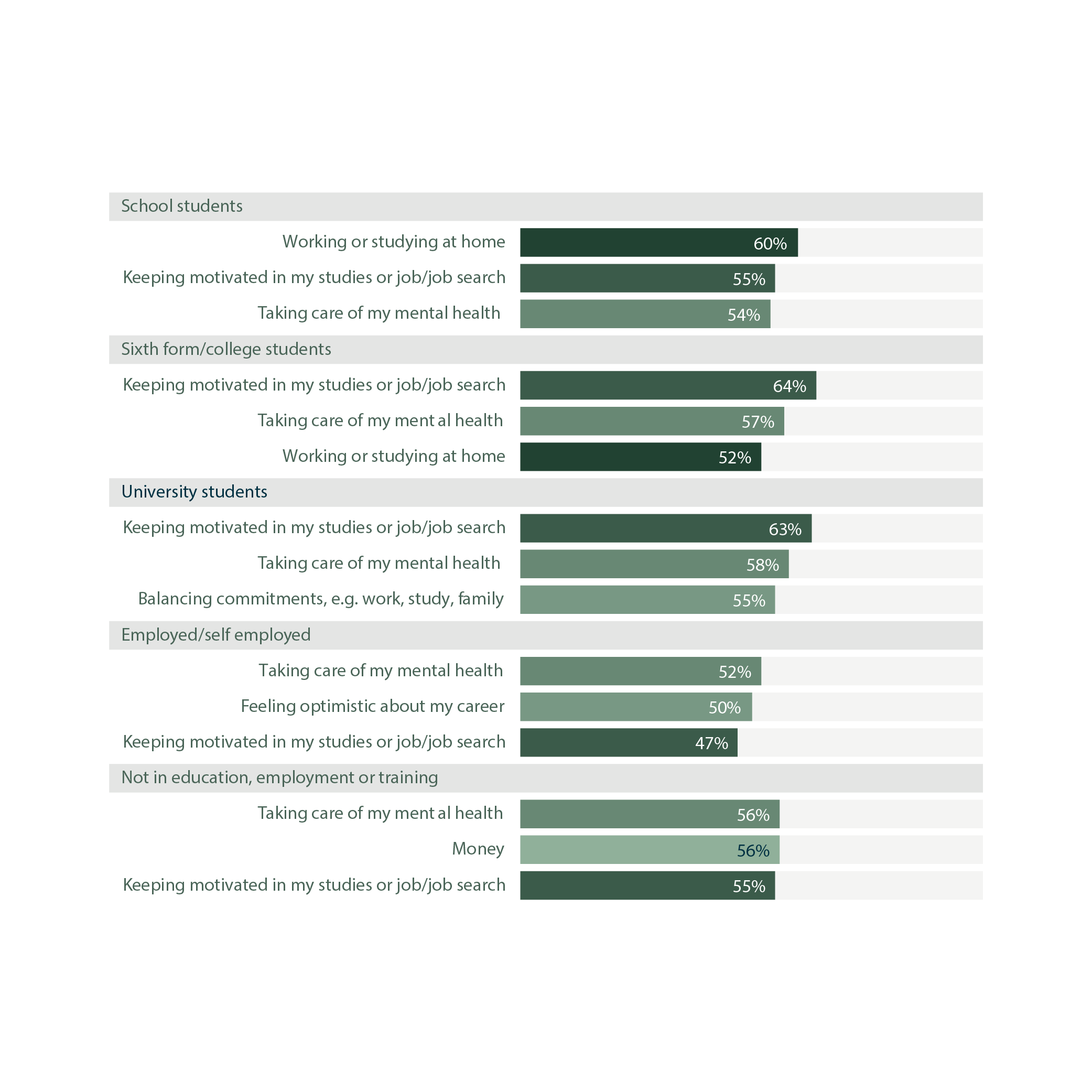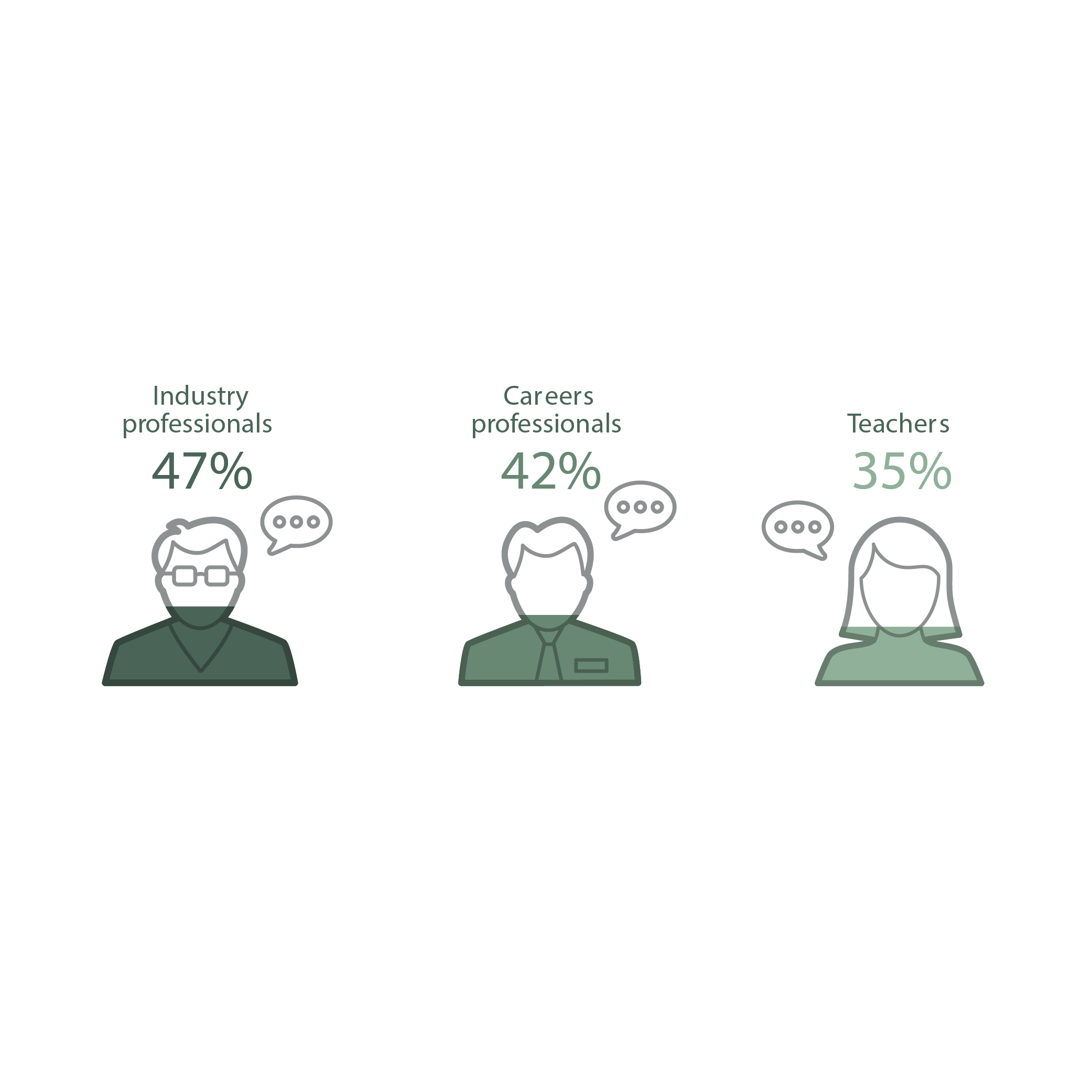
Early Careers Professionals : The Challenges and the Solutions
Aug 12, 2022There are many issues uniquely faced by those early on in their career. There is the confusion that comes from transitioning from the world of study to the world of work, and often finding that the latter doesn't meet one's expectations. Added to this in recent years was the impact of the pandemic. One result of which was that work which may previously have offered on the job learning instead moved to hybrid or online. These various ways of working each have their benefits but also their drawbacks. For example, remote workers have been found to be less engaged in their work, and also to experience higher rates of mental health problems which they may feel unable to talk about. Added to this the simple fact that for early career professionals this will be their first experience of the world of work, and it is a recipe for stress.
Chart 1 below taken from a recent early careers survey illustrates the biggest challenges faced by different groups. Taking care of their mental health features strongly.
Biggest challenges of the last year

Smith and Greaves in their Early Careers Survey 2022 shed more light on the situation with some revealing statistics. For example, “40% of 2021 graduates said they planned to leave their current employer this year”. If we look into the reasons behind this, the most common reason was to “advance their career (39%)”. This suggests that opportunities to grow with their current employer are not available. Added to this is a high degree of uncertainty over career plans, with 43% saying they felt “not at all certain” or “not very certain” of their career plans. This uncertainty seems to have been exacerbated by the pandemic, giving rise to 59% of respondents choosing a different career or industry to that in which they started out. In general, COVID forced people to rethink their priorities, and graduates are no exception.
The pandemic, including its several lockdowns, meant there was less opportunity for young people to get work experience. It’s not surprising therefore that Smith and Greaves (2022) found that a significant number (42%) of respondents expressed feelings of “unpreparedness” for getting a job/apprenticeship. University finalists (47%) were more likely to express this than others. The authors conclude that “those who hadn’t done any work experience within the last 12 months were less prepared than respondents who did.” This is a difficult situation for both the young person who feels unprepared, and the potential employer who may struggle to find applicants with the desired experience.

What does all of this mean for organisations?
There is a higher incidence of graduates leaving their jobs, which has costs for the organisation, both in terms of losing talent and not getting a return on the investment of time and money involved in training the graduates in the first place.
What is the advice for organisations in this situation?
The Institute of Employment Studies(IES) concludes their UK Labour Market Statistics report (May 2022) with the advice that employers will need to “step up” through “more inclusive recruitment, better job design (particularly around shift notice, patterns and flexibility), improved induction and in-work training, and workplace support with health, caring and wider needs.” Emma Rosen, author of The Radical Sabbatical in her recent interview with us, advises companies to be more open, flexible and hyper-personalised, thoughtful and creative in their outlook. Emma also highlights the need for ongoing career conversation to engage and motivate early career professionals.

The outlook is not all bad. Some organisations are doing good work already to tackle this issue. Based on a recent study from Gallup[1], they found that teams with thriving workers see “significantly lower absenteeism, turnover and accidents; they also see higher customer loyalty.” However, the study describes how the current workplace system in general is “broken” and that improving engagement and happiness through coaching and collaborative managers is key. That is where we at The Careers Company can help - either to supplement existing workplace strategies, or create something new.
Chart 2 shows the top 3 sources of careers advice that respondents found “very helpful”

Essentially, we provide the tools, techniques, and processes for more effective Career Conversations. We believe these are the key to employee retention and ongoing career happiness. Here are just a few of the things that we have done for our clients:
- Tailored Career Coaching packages aimed at both individuals or organisational cohorts e.g. interns, apprentices or graduate trainees. Individuals are partnered with one of our professionally certified, specialist career coaches.
- Through our Career Conversations with my team interventions (workshops, coaching and guides) we equip managers and HR leaders to build their capability and confidence for higher quality Career Conversations. We tailor these to your organisational context and can run them at your organisation or online
- Finally, we realise that there may be gaps in an organisation’s overall career development system for effective Career Conversations to occur. Our signature Employee Career Paths process and other, more bespoke interventions (e.g. set up of a Sponsorship Programme or review of their Career Strategy) can help organisations address these gaps

For the summer of 2022 we are piloting a fantastic package with our partners at Would You Rather Be https://wouldyouratherbe.com/ If you are running apprenticeships or internships this summer or want to make your graduate programme stand out from your competition, look no further. The Early Career Explorer package.
https://www.thecareerscompany.com/early-career is a fantastic addition. It provides each participant with a hyper-personalised Career Report and, through the 90min coaching session with one of our accredited coaches, the programme participants can explore their career options, the type of environment they thrive in, and generally whether they are on the right track.
For organisations using our package we can also provide thematic analysis of both the common career preferences and challenges your cohort is facing. If you are an evidence-based organisation like we are, we know that this is music to your ears.
Interested in resolving your early careers attrition challenge? Contact us today. We would love to hear from you!
Meena Anand
Meena is the Founder and CEO of The Careers Company. She also is a Non-Executive Director for a number of different organisations in the UK. Prior to transitioning to her portfolio career, Meena enjoyed a successful international career as an HR Director for a number of FTSE 30 organisations. She has been recently recognized by Cranfield University as one of the 100 ‘Women to Watch’ in 2021 and is on the Inspire List (created by Trustees Unlimited).
Stay connected with news and updates!
Join our mailing list to receive the latest news and updates from our team.
Don't worry, your information will not be shared.
We hate SPAM. We will never sell your information, for any reason.
